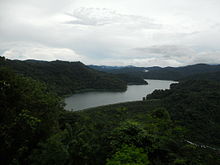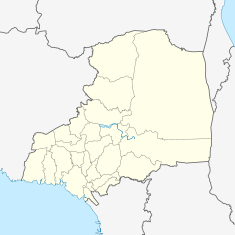
Summary
Angat Dam (Tagalog: [aŋˈɡat]) is a concrete water reservoir embankment hydroelectric dam that supplies Metro Manila and nearby provinces with water. It was a part of the Angat-Ipo-La Mesa water system. The reservoir supplies about 90 percent of raw water requirements for Metro Manila through the facilities of the Metropolitan Waterworks and Sewerage System and it irrigates about 28,000 hectares of farmland in the provinces of Bulacan and Pampanga.
| Angat Dam | |
|---|---|
 View of Angat Dam from San Lorenzo (Hilltop), Norzagaray, Bulacan. | |
 Location of Angat Dam in Bulacan  Angat Dam (Luzon)  Angat Dam (Philippines) | |
| Official name | Angat Hydroelectic Dam |
| Location | Barangay San Lorenzo, Norzagaray, Bulacan, Philippines |
| Coordinates | 14°52′15″N 121°08′30″E / 14.87083°N 121.14167°E |
| Construction began | November 1961 |
| Opening date | October 16, 1967 |
| Construction cost | Php 315.344 Million[1] |
| Operator(s) | National Power Corporation |
| Dam and spillways | |
| Impounds | Angat River |
| Height | 131 m (430 ft)[1] |
| Length | 568 m (1,864 ft)[1] |
| Width (base) | 550 m (1,800 ft)[1] |
| Spillways | 3 |
| Reservoir | |
| Creates | Angat Reservoir |
| Total capacity | 850×106 m3 (30×109 cu ft) |
| Power Station | |
| Turbines | 10 Vertical shaft, Francis turbine[1] (Includes turbines from the main powerhouse and the auxiliary powerhouse) |
| Installed capacity | 256,000 kW^1 |
Description edit
Angat Dam is located within the Angat Watershed Forest Reserve in Barangay San Lorenzo (Hilltop), Norzagaray, Bulacan. It supplies potable water to Metro Manila and powers a hydro-electric power plant. The dam is 131 meters high and impounds water from the Angat River that subsequently created the Angat Lake.
Angat Dam has a normal high water level of 210 meters, according to the Philippine Atmospheric, Geophysical and Astronomical Services Administration (Pagasa).
It has three gates opening a total of 1.5 meters to gradually release water that had accumulated due to incessant rains during typhoons.
In comparison, Ipo Dam, located downstream of Angat Dam, has three gates and 100.8 meters as its normal high water level (NHWL). Ambuklao Dam on the other hand, has two gates with NHWL at 752 meters. Binga Dam which sits downstream from Ambuklao has three gates and NHWL at 575 meters. San Roque Dam, which was receiving water from Ambuklao and Binga, has NHWL at 280 meters.[2]
Angat Dam supplies potable water and energy to Metro Manila and nearby areas. Tourists also visit the dam for fishing, boating and hunting.[3]
In the early 1990s, the Philippine government and Metropolitan Waterworks and Sewerage System studied tapping the Umiray River basin in General Nakar, Quezon as an additional source for the Angat Dam Reservoir, as the growing population of Metro Manila pushed the demand for potable water up. This has led to the Umiray-Angat Transbasin Project (UATP), which began in July 1995 completed in June 2000 with a total cost of PhP 4 billion. The UATP involved constructing a 13 km 4.3 meter diameter diversion tunnel which channeled the headwaters of Umiray River at its intake point to Macua, in Doña Remedios Trinidad, Bulacan, providing additional of 300 mld to the Angat Dam Reservoir.[4][5][6]
As of 2010, Angat Dam is providing 4,000 million liters a day (mld) out of a demand of 4,395 mld, and this is to grow to 5.054 mld in 2015, and 4,680 mld in 2020. Successive administration have already pushed for additional sources, such as the Laiban Dam, Kaliwa Dam, and Kanan Dam.[7]
History edit
Super Typhoon Emma (Welming) edit
Emma hit Central Luzon in 1967, passing through the Angat Hydro-Electric Project and Dam of the National Power Corporation (NPC or Napocor) in Norzagaray, Bulacan. The heavy downpour caused the water in the Angat Dam reservoir to rise perilously to a danger height of 212 meters above sea level. Napocor opened the spillway gates to prevent an overflow of water from the dam.
The Engineering Construction, Inc. (ECI), which had been doing construction work also in Norzagaray, suffered losses to its equipment and properties when the extraordinary large volume of water rushed out of the spillway gates and hit ECI's installations and construction works.[8] National Power Corporation vs. Court of Appeals (G.R. No. L-47379, May 16, 1988).[9]
Super Typhoon Rita (Kading) edit
At about 2100 hours on October 26, 1978, during the height of the typhoon "KADING", NAPOCOR opened simultaneously all the three floodgates of the Angat Dam. NPC started to open the three floodgates simultaneously from 1 meter to 8 meters at 0100 hours of October 27, 1978, until all floodgates were opened to the maximum of 14 to 14.5 meters by 0600 hours of the same day. These acts of NPC resulted in the inundation of several towns in Bulacan near Angat Dam. Hardest-hit was Norzagaray, Bulacan. About 100 Garayenos died and million of pesos worth of properties (houses, farms, plants, working animals) were destroyed.
Eleven civil suits were filed against the electric corporation in the Regional Trial Court of Malolos. NPC countered that there was very little opening of the spillways, ranging from 1 meter to 2 meters, but from midnight or from the first hours of October 27, 1978, the opening of all the three spillways started at 5 meters and swiftly went as far up as 14 meters. The court noted that had the opening of all the three spillways been made earlier and gradually, there would have been no need to open the same suddenly: "What made the situation worse was that the opening of the spillways was made at the unholy hours when residents were asleep. The plaintiffs all testified that they were never given any warning that the spillways would be opened to that extent." [10][11]
Note edit
^ The sum of both installed capacity. The main powerhouse has 200,000 kW (4 X 50,000 kW) installed capacity while the auxiliary powerhouse has 46,000 kW (3 X 6,000 kW, 1 x 10,000 kW, 1 x 18,000 kW) installed capacity.[1]
References edit
- ^ a b c d e f "Angat Dam". Japan International Cooperation Agency. Archived from the original on October 1, 2009. Retrieved February 19, 2010.
- ^ Santos, Matikas (August 13, 2012). "Dams Releasing Water in Anticipation of Coming Rains". Inquirer.net. Archived from the original on January 29, 2020. Retrieved January 29, 2020.
- ^ "Angat Hydroelectric Dam (Norzagaray, Bulacan)". bulacan.gov.ph. Archived from the original on February 24, 2017. Retrieved January 29, 2020.
- ^ "Sector Expertise: Water Resources". EDCOP. Archived from the original on June 2, 2021. Retrieved May 31, 2021.
- ^ Project Completion Report on the Umiray-Angat Transbasin Project (Loan 1379-PHI) in the Philippines (PDF) (Report). 2004. p. 50. Archived (PDF) from the original on June 2, 2021. Retrieved May 31, 2021.
- ^ Impact Evaluation Study on Public-Private Partnership the case of Angat Water Supply Optimization Project and the Metropolitan Waterworks and Sewerage System (PDF). Japan International Cooperation Agency (Report). Japan International Cooperation Agency. 2003. Archived (PDF) from the original on June 2, 2021. Retrieved May 31, 2021.
- ^ Alikpala, Ramon (n.d.). New Water Sources of the Metropolitan Waterworks and Sewerage System (MWSS) (PDF) (Slide deck). Public-Partnership Partnership Center. Archived (PDF) from the original on June 2, 2021. Retrieved May 31, 2021.
- ^ "Dam Operator Liable for Negligence in Flooding". Philippine e-Legal Forum. October 14, 2009. Archived from the original on June 14, 2013. Retrieved October 15, 2012.
- ^ "This Time of Calamity: CL Farmers Renew Call for Justice for EJK Victim Geertman". Alyansa ng mga Magbubukid ng Gitnang Luson (AMGL). August 19, 2012. Archived from the original on May 24, 2013. Retrieved October 15, 2012.
- ^ G.R. No. L-55273-83. Archived from the original on April 19, 2015. Retrieved October 15, 2012 – via The Lawphil Project.
- ^ G.R. No. 96410. Archived from the original on April 19, 2015. Retrieved October 15, 2012 – via The Lawphil Project.


